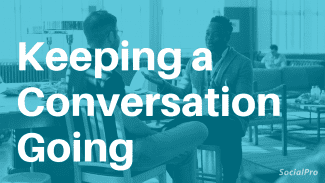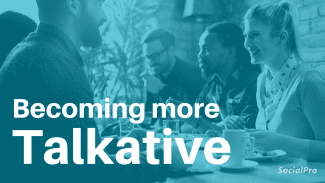I often used to run out of things to talk about. Either because I got stuck in small talk that died out or because I tensed up so that my mind went blank.
Sometimes, a conversation is meant to end, and there’s no need to push it. But if you often run out of things to say, this guide is for you.
1. Practice saying what’s on your mind
I used to worry that what I said would sound dumb or too obvious. When I analyzed socially savvy people, I learned that they say mundane, obvious things all the time.[2]
For example:
- “It’s really cold today, isn’t it?”
- “I love the sandwiches they sell here.”
- “Huh, the traffic isn’t usually so light at this time of day.”
When you start a conversation with someone new, you may feel like small talk is awkward and meaningless. The truth is that small talk helps us “warm-up” to each other and signals that we’re friendly, easy-going, and open to interaction. People will judge you for what you say as little as you walk around and judge others for what they say. Instead of trying to say smart things, say whatever’s on your mind.
2. Ask something personal
“I often run out of things to say with friends. I get stuck in small talk, and the conversation dies out”.
– Cas
Ask people slightly personal questions to make boring topics interesting.
For example:
If you’re talking about work:
- “What do you like most about your job?”
- “Why did you choose [their field of work]?”
- “If you could do any kind of work, what would you do?”
If you’re talking about the cost of renting in their city:
- “Where would you love to live if you could pick anywhere on earth?”
- “Have you lived in many other places?”
- “Did you grow up around here?”
- “Would you ever move out of the city to save on rent, or do you think the cost is worth it?”
This way, you move from small talk to personal mode. In the personal mode, we learn about:
- Plans
- Likes
- Passions
- Dreams
- Hopes
- Fears
When you transition the conversation like this, you’re engaging the other person more, and it’s easier to make conversation.[3] At this point, you get to know each other rather than just making small talk.
See my guide on how to make interesting conversation.
3. Focus on the conversation
Sometimes, all we can think about is if we come off as weird, if we’re blushing or that our heart is about to jump out of our chest. The key is to calm your mind by focusing intensively on what the other person is saying:
In a study conducted at Macquarie University on attentional focus in social anxiety, they found that when the participants focused their attention on what the other person was saying, instead of on their internal reactions like heart rate, blushing, concern over how they were being perceived, they were less nervous and had fewer physical reactions as a result.[1]
When you focus on what your partner is saying you won’t have time to feed your internal anxiety because your mind is caught up in the conversation. When you worry less about yourself, it’s easier to come up with things to say.
4. Stop trying so hard
I decided to stop trying so hard. I accepted that conversation didn’t have to go great and that people didn’t have to like me. Ironically, that helped me relax and be more pleasant and likable to be around.
Rather than being on edge trying to come up with things to say, allow for silences. Be okay with taking a few seconds extra to formulate an answer. Rather than trying to make people like you, make sure that they like being AROUND you.
You can do that by being a great listener. When you talk, you say things that you think are fun or interesting for the other person to hear, not things that are supposed to make you look a certain way. (Humblebragging, talking about cool stuff you’ve done, etc.)
People want to be liked and heard and are interested in people who show them that kind of genuine attention. As Maya Angelou said, “At the end of the day, people won’t remember what you said or did; they will remember how you made them feel.”
Read more here in our guide on how to be more likable.
5. Watch their feet to gauge their interest
Sometimes a conversation dies out because the other person tries to end it, and sometimes they want to talk but just don’t know what to say. How do you know the difference?
Their body language will tell you if they are inclined to spend time talking or if they have other plans. Look at what way their feet are pointing. Is it toward you or away from you? If it’s toward you, they are inviting further conversation. If it’s away from you, they might want to get away from the conversation. If they also spend a lot of time looking in the direction of their feet, it’s an even stronger signal that they want to leave.
If they point away from you, you can wrap up the conversation with one or two sentences.
For example:
- “It’s later than I thought, so I’d better get going! It was great to see you, hopefully we can catch up soon.”
- “I’ve really enjoyed chatting to you, but I’ve got a busy afternoon ahead of me. See you later.”
- “It was really nice talking to you. I think it’s time for me to get back to work.”
If they point their feet at you and look at you, you can feel confident that they’ll want to keep talking.
6. Use things around you to inspire new topics
Take inspiration from your environment and make a comment or ask a question about it to not run out of things to say.
For example:
- “I love these plants. Are you good at growing stuff?”
- “I like this new office. Is your commute longer or shorter now?”
- “That’s an interesting painting, isn’t it? I like abstract art. Do you?”
- “It’s so warm today! Do you like the hot weather?”
- “I love the music in this place. I can’t remember this band’s name, though. Do you know it?”
Some avoid simple statements like these because they think that they are too mundane. Don’t! They work great as inspiration for new, interesting topics.
For more tips on how to keep a conversation going, I suggest following our Instagram channel:
7. Refer back to something you talked about before
When the topic you’re talking about dries up, feel free to go back to any topic you talked about before.
Let’s say that someone mentions that they are in the import business, and then the conversation moves on. A few minutes later, when it fizzles out, you can go back to asking something about the import business. For example, you could say, “You mentioned that you’re doing imports. What do you import more specifically?”
Conversations don’t have to be a straight line. When a topic dies out, feel free to move to a new one or a previous one.
8. Make simple, positive statements
I think of these as conversation buffers. They keep the conversation going, but they’re not too deep.
For example:
- “What a cool house.”
- “It’s sunny today.”
- “Those flowers are pretty.”
- “That was a helpful meeting.”
- “What a cute dog.”
This is a fairly organic way to move on to new topics. It helps you see if you have a connection to something else like being interested in architecture or what weather you prefer and, based on that, where you’d rather live.
You don’t need to fabricate statements. Your mind already makes statements about things – that’s how the mind works. Feel free to let those thoughts out.
9. Ask open-ended questions
Open-ended questions give the other person a chance to think about their answer and say something more detailed than yes or no.
For example:
- Rather than asking “Was the vacation good?” (Close-ended), you can ask, “How was your vacation?” (Open-ended)
- Rather than asking “Did your team win last night’s game?” (Close-ended), you can ask, “How was last night’s game?” (Open-ended)
- Rather than asking, “Did you enjoy the party?” (Close-ended) you can ask, “Who was at the party?” or “What kind of party was it?” (Open-ended)
Asking questions like these often gives more elaborate answers, and because of that, you’ll get to know each other faster and on a deeper level.
10. Look for mutual interests
When we find out that we have something in common with someone, it’s an automatic spark to the friendship (and a hint of relief). Make it a habit to mention things you’re interested in.
If someone asks what you were up to over the weekend, you could say, “I met up with my book club yesterday,” or “I went to the gym and then took my son to his hockey game,” or “I watched this harrowing documentary about the Vietnam war.”
Mentioning things you’re interested in will help you “scout” for mutual interests. If you come across someone who’s also interested in books, hockey, or history, they’ll probably want to hear more about it.
11. Know that people want to learn about you too
It’s a myth that people only want to talk about themselves. They also want to get a picture of the person they’re talking to – you. Don’t be afraid to share things about yourself as long as you’re also showing interest in the other person.
Balance with the other person how much you share. If someone gives you an in-depth explanation of their job, give them an in-depth explanation of your job. If they just briefly mention what they do, briefly mention what you do.
This helps us bond because we are revealing things to each other at the same pace. You’re keeping it interesting for your partner because you’re opening up, too.
12. Ask follow-up questions
Let’s say you’ve just learned that the person you talk to is originally from Connecticut. To move the conversation along, you could ask “what,” “why,” “when,” and “how” questions to draw that experience out more.
For example:
- “What was it like to grow up in Connecticut?”
- “Why did you move here?”
- “How did you feel about leaving home?”
- “When did you first think about leaving Connecticut?”
- “What do you like most about your new home?”
- “How long did it take you to find a new house here?”
Let your natural curiosity guide you. Share related information about yourself in between your questions so you don’t come off as an interrogator. If they are giving you full, thoughtful answers, keep going.
13. See a person as a map with blanks to be filled
Everyone comes from somewhere and has interesting stories related to their interests, dreams, aspirations, and past. Think of getting to know someone as a gentle quest to understand more about where they come from, what they like, and their future dreams.
You’re asking questions with the purpose of filling in the blanks of where they’re from, what they do, and what their future plans are.
For example:
To learn more about their life growing up, you could ask:
- “Where did you grow up?”
- “Do you have any siblings?”
- “Did your family live close by when you were a kid or did they live far away?”
- “Did you have any pets as a child?”
To learn more about their education or school, you could ask:
- “Where did you go to school?”
- “What did you study?”
- “What was your favorite class?”
To learn more about their passions and hobbies, you could ask:
- “What do you love to do in your free time?”
- “Do you have any particular hobbies?”
- “What do you usually do on the weekends?”
To learn more about their hopes and dreams, you could ask:
- “What’s your biggest ambition in life?”
- “What’s something you’ve always wanted to do but haven’t had the chance yet?”
Over time, filling in these blanks gives you an unlimited number of topics to talk about, and while you ask questions (and share about yourself in between), you get to know each other.
14. Be comfortable with silence
Silence happens. It’s not a bad thing. It’s a natural part of a conversation, and it’s okay to just let it happen. There’s no need to fill it as quickly as possible. In fact, silence has a purpose. It gives you time to take a breath and think and to make the conversation more meaningful. Letting there be silence and not being anxious about it helps you bond with the other person. If you learn to be comfortable with the silence, it can be refreshing not to have to talk all the time.
Filling every break in a conversation with words can come off as anxious. Remember that a conversation is between two people, who are both participating equally. If you need a few seconds to take a break, that’s fine. They might need it too.
15. Practice being more relaxed when talking
“Why can’t I think of things to say with someone I like? I specifically want to learn how to never run out of things to say with a girl I know. Around her, I get extra nervous and run out of things to talk about.”
– Patrick
It’s normal to be nervous when you’re meeting someone for the first time, especially if it’s a girl or a boy you like.
Practice staying a bit longer than usual in a conversation, even if you’re feeling nervous and would rather just leave. Our instinct is to get away from what makes us nervous. But you want to stay longer in those situations! You’re slowly teaching your brain that nothing bad happens if you do, and you’re slowly becoming better at handling these situations.
Here’s our guide on how to not get nervous around people.
16. Know that silence isn’t your responsibility
Silence is not a failure. A sign of a great friendship is that both can be quiet together and not feel uncomfortable about it. It might feel like you’re the one responsible for coming up with things to say, but the other person is likely thinking that it’s THEIR responsibility. They aren’t waiting for you to talk. They’re also trying to come up with things to say!
If you show that you’re calm in the silence and OK with not saying anything, your friend will be, too.
Read our guide on how to be comfortable with silence.
17. Dive deeper into topics when texting
When you’re texting with someone, have the following two rules in mind. These rules will make your conversations more interesting, and it’ll be easier to come up with things to say:
Rule 1: Lead by example
If you want an interesting answer from someone, share something interesting first.
For example:
- “Today I almost missed the bus because I saw two squirrels fighting. How was your morning?”
- “My boss just announced that this year’s office party will have a circus theme. I hope I don’t have to dress up as a clown. How’s your day going?”
- “I got home this afternoon to find that my dog had knocked over my yucca plant and rolled around in the soil. He looked very pleased with himself. How’re you?”
You don’t have to think very hard, because you can use things that happened during your day for inspiration. It can also inspire a more thoughtful reply than “How was your morning/afternoon/day?”
Rule 2: Always go deeper
Always go deeper into a subject if you want the conversation to be more interesting. It’s also easier to come up with things to talk about if you go deeper into a subject.
To continue the first example in the step above, you can go deeper by sharing how you feel in the mornings (stressed, happy, dreadful) and ask how they feel about their mornings. From now on, you can talk about personal feelings and thoughts about life.
For example:
You: Today I almost missed the bus because I saw two squirrels fighting. How was your morning?
Them: Haha, squirrels are crazy. My morning was OK. I’m kind of tired though. I don’t know why. I went to bed early. It’s a mystery.
You: I know how that feels. I’m the sleepiest person I know in the mornings. Is it just me, or is 8 hours of sleep not enough? It’s like as I get older, I need more and more sleep.
Them: It’s not just you. When I was younger I used to stay up all night, party, then go into work…sometimes I miss my college days because… [carries on talking about college and partying]
The conversation gets more interesting, and you get to know each other on a deeper level.
18. Remember that conversations are meant to end
Not everyone you meet will be someone you connect with on multiple levels. Sometimes it’s just a bit of small talk, and that’s all you have time for. Time, circumstances, how you feel that day, how they feel that day, lots of things decide how much emotional space we have for conversation. No conversation is meant to go on forever.
A conversation is not a failure just because it’s short. One thing is certain. The more conversations you’ll have, the better of a conversationalist you’ll become.
A real-world example of how to never run out of things to say
Here’s what you will learn in the video:
00:15 – The solution to never running out of things to say
00:36 – Linear- vs Nonlinear conversations
01:00 – Won’t you come off as random switching the subject?
01:24 – Real life example of Conversational Threading
02:30 – How to best practice Conversational Threading
02:46 – The best thing about learning this













I feel like I’ve been getting better at confidence in myself and my abilities so I’ve had success in just simply talking more in general. However I feel like there are many instances where I’m not a real participant in conversation, instead I’m like a mirror nodding and smiling and agreeing but not being me. I feel like its because like alot of ppl have been saying is because I dont like where I am in life and feel I have nothing to offer the other person
Hi David,
I’m an introvert and I really do not have close friends. I have trouble speaking clearly or with my pronunciation because I have a mild medical condition that effects my nasal and throat. So sometimes when I speak the listener will either correct the way I pronounce words or due to my accent and mispronounce of words they tend to make judgement on me. ( I’m losing friends here). I never talk about my condition as I do not want empathy. All I want are friends who do not judge me base on how I speak but I know it’s difficult especially when I’m trying to be friends for the first time.
I’m also socially awkward especially when I’m encountering people who seem to know it all and I’m left little to talk about due to lack of subject knowledge. Sometimes I do feel a bit small or through their body language Im getting the signals that the person doesn’t agree to anything i said and it’s difficult for me to move on.
I will get nervous while speaking, only because of my language
Hi. I suffered from social anxiety since a couple of years ago. I read a lot about it, I try to get out there and talk to people, but I always end up making the same mistakes. Overthinking what I’m about to say, feeling like everyone can tell I’m weird and anxious, awkward silences…
Yesterday, the mother of a classmate called my mom to discuss something about school and she told her that the girl didn’t want to talk to me cause she thought I didn’t like her, and I always thought she didn’t like me!!!
Conversations are awkward cause I make them so, people don’t feel comfortable around me because I don’t feel comfortable. How can I stop setting them off?
*I meant something like luring them away. Sorry, English is not my first language lol
Hi David. I am enjoying your videos. I found the conversational threading interesting because it did make me realise that I have been doing this all along. What I got out of this is that if you have a general interest in people ( whatever walk in life) this just happens naturally because you want to know more about them so I guess being a little nosy can sometimes be a positive trigger ( I don’t mean on a deep personal level that would make the recipient uncomfortable) but when bonds form further down the track, expanded threading naturally occurs because you will know that person on a more personal level. My problem has been that I always think the next person is above me and this is when I can become a little selective with whom I wish to mingle with. Should that person/s I was referring to approach me and start a conversation, then I can use expanded conversation with ease and realise that at the end of the day we are all human and some people are just not as approachable as some but the barrier can be knocked down. I know I’m not an expert but life experiences has a way of telling you that we are all human at the end of the day and the only difference is the path of life we walk on . Thankyou
Nick
Where do I find that pretty darn good material that your website talks
I tend to talk really fast and have trouble finding the right words to say. Most intimidating are people who I find attractive due to intelligence or looks and I get completely shutdown on how to approach them. Also, not being in the place I want to be in life tends to hold me back on how interesting I may seem to another.
Sometimes I mumble and get embarrassed and discontinue any ongoing conversation
I’m a chicken approaching females. especially attractive ones. I have always been shy since I’ve been rejected in kindergarten by my friends and girlfriend.
Thank you so much for sharing these wonderful ideas. I can’t wait to try them out and see how exciting the results will be.Am naturally an introverted person but am sure that doesn’t mean am not capable of being social and keep a conversation with people… I think that the main thing holding me back socially is the fact that am dissatisfied with the life am currently living and that makes me feel like I really have nothing to offer others.. I have generally been bad at keeping in touch with family and friends and this is really eating me up.Talk about many things to work on!
Thanks for your advice. I actually struggle to talk to people I know well because of the awkward silence and the fact that the topic dies after I talk. I’ve meaning to improve on this but I wasn’t aware of the fact that my mindset was that conversations had to be linear. I’ll try to implement your tips.
It happens to me a lot. I feel like a responsibility to keep coming up with something in order to keep on making the conversation go on. If I fail, I feel kinda rejected.
It’s happened alot to me , and it was akward , but I started to talk more than before , there’s still these silence moments but I’m in progress .
Thank you so much!
I too have faced the awkwardness of silence and not knowing what to say. Now I have a new tool to use. I will be implementing right away in the very next social situation I am in. You are awesome!!!
My frail body build which has been center of remarks with every person I have dealt with. I am super conscious about that and my knocked knees which appear crooked and grab attention when I walk.
Erica
I feel awkward making a contribution to a conversation because I am worried that I will lose the thread of what I am saying, or not be able to find the words I want. Even though I know I have a good vocabulary and can express myself well when given time to think. Any advice on this please?
I want to do this so I will feel more relaxed in soical situations,and my face will go red far less
i often face the problem of awkward silence and the fear of it makes me avoid talking to people. i worry that i will seem uninteresting. thanks for the tips.
On many occasions,I face this awkward silence.
This is a good advice on the right time.
I will give it a shot.
I normally don’t have problems talking to strangers but I get uncomfortable when subjects die out.
I think the conversational threading is interesting, but isn’t it a bit contriversal with the OFC method where I’m not supposed to be thinking about the next step, only being interested in what the other person is saying.
Since you’ve been working with nervous people I’m wondering if you’ve got any methods to avoid blushing when being nervous. For me it occurs after during presentations mostly or drinking, and since I do a lot of presentations at work it’s causing me a bit of a problem.
That’s a great observation Karolina, you seem to have understood our material on a very deep level that we didn’t explain enough.
In short, I’d say OFC is very effective to reduce anxiety and nervosity. So when that is your main problem, focus on OFC. But when you are not that nervous, conversational threading can be of more use, at least for a while to learn how to find new subjects easily. I’m very interested to hear about your experience with the two “opposing” methods. Which one works best for you?
I’m not that familiar with blushing yet. Have you tried OFC? I’m thinking that focusing outwards should reduce blushing since blushing is triggered by self-conscious thoughts. I will research this topic more closely and write an article on it in the future because you are not the first to ask.
What is OFC?
Here you go Debbie 🙂
https://socialself.com/is-it-possible-to-double-your-confidence-in-5-minutes/
It’s not so much what’s holding me back, but im finding it difficult to talk to influencers online. I’m following a lot of Instagram accounts which post meaningful comments and inspiring photos and I would really like to have a conversation about photography & more, with them. However, I feel like I don’t know what to say, in order to start this type of conversation.
HI David
Although I still learn English. But I found a benefit in the conversation.
What about when we can’t think of anything to ask/talk about previous conversations? I mean, I have tried that before but it seems that sometimes I am so worried in not hitting an uncomfortable silence that my mind keeps racing and I can’t even think of interesting questions to make about previous conversations because my mind is so hyper…
Hi Gui, I see your problem. Conversational Threading is probably not that useful for you until you first learn to relax a bit more in conversations. Have you tried the OFC-method? I think that is a great starting point for anyone in your situation.
Follow OFC.
🙂 Viktor, Namaste.
David and Viktor are really the best. i made my brother Ivan subscribe to SocialPro.
Thank you Linus, we try our best! 🙂
I’m loving your blog so far, David, and I feel like I’ve barely even scratched the surface of what you have to offer as far as social skills go. You recommended sharing the baggage that we may be carrying and I came here to do just that ?
As a kid I always felt like more of an outsider than someone who knew the ropes of being sociable or fitting into my environment. I’m now in college and I fit in better than ever but i feel like I still lack in terms of being conversational. Maybe it was because of bullies from childhood or just not really clicking with classmates as I got older but I’ve kind of become a stoic with a kind of resting pissed face. I feel like this gives off a negative vibe to others that I’m dying to overcome.
So far your advice seems awesome but I’m not anywhere near through with all your tips. What do you think is the most important article you have on your site?
Hi Dylan!
Yeah it takes some time to catch up if you, like me, didn’t spend hours socializing every day as a kid:) Luckily, you’ll be able to improve much faster when you follow a proven system rather than trial and error!
Specifically focusing on conversations, I think this guide will be valuable to you!
https://socialself.com/blog/make-interesting-conversation/
thanks for the tips david 🙂 my biggest problem is that i just say stupid things when i dont really mean it. i would just want to be in control of what i say and enjoy talking with people more 🙂
I hear you, this happens to me sometimes too.
This sounds really interesting, I will def try it out!
What’s holding me back is probably mostly that I don’t meet enough new people, I just don’t feel it’s worth trying until I feel I got a better chance. Because it takes so much energy to get to know someone and then you don’t even know if they are gonna want to hang out with you or if they are just gonna be “busy”. That’s why I read your material, I hope it helps to give me an edge!